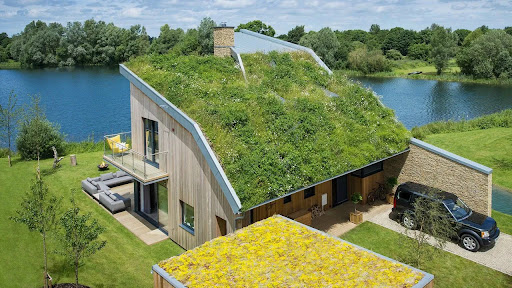
The future of sustainable and eco-friendly homes
As the world becomes more environmentally conscious, sustainable and eco-friendly homes are becoming increasingly popular. These homes are designed to minimize their impact on the environment by using renewable resources, reducing energy consumption, and minimizing waste. In this article, we will explore the future of sustainable and eco-friendly homes.
1. Green roofs and living walls
Green roofs and living walls are becoming popular features in sustainable homes. These features help to reduce energy consumption by providing insulation and reducing the urban heat island effect. Green roofs also help to reduce stormwater runoff, improve air quality, and provide additional green space in urban areas.
2. Smart homes
Smart homes are becoming more common and are a key feature in sustainable homes. These homes are equipped with advanced technology that can monitor and control energy consumption, heating, and lighting. This technology helps to reduce energy consumption and can save homeowners money on their energy bills.
3. Renewable energy sources
Renewable energy sources such as solar panels, wind turbines, and geothermal heating systems are becoming more affordable and accessible. These energy sources can help to reduce a home's reliance on fossil fuels and can help homeowners save money on their energy bills. In the future, it is likely that sustainable homes will be powered entirely by renewable energy sources.
4. Sustainable materials
Sustainable homes are often constructed using sustainable materials such as bamboo, reclaimed wood, and recycled materials. These materials are renewable and have a lower impact on the environment than traditional building materials. In the future, it is likely that sustainable homes will be constructed using only sustainable materials.
5. Passive design
Passive design is a design approach that maximizes natural light and ventilation to reduce energy consumption. Passive design features such as well-insulated walls, double-glazed windows, and shading devices can help to reduce energy consumption and improve indoor comfort. In the future, it is likely that sustainable homes will be designed using passive design principles.
6. Water conservation
Water conservation is becoming an important feature in sustainable homes. Water-saving features such as low-flow toilets and showerheads, rainwater harvesting systems, and greywater recycling systems can help to reduce water consumption and minimize water waste. In the future, it is likely that sustainable homes will be equipped with advanced water-saving features.
In conclusion, sustainable and eco-friendly homes are becoming increasingly popular as people become more environmentally conscious. The future of sustainable homes is likely to include features such as green roofs and living walls, smart home technology, renewable energy sources, sustainable materials, passive design, and water conservation features. As these homes become more common, they will help to reduce our impact on the environment and create a more sustainable future.
Title:-The importance of home inspections before purchasing a property
Buying a property is one of the biggest financial investments most people will make in their lifetime. It is important to ensure that you are making an informed decision before signing on the dotted line. One way to do this is to have a home inspection before purchasing the property. In this article, we will explore the importance of home inspections before purchasing a property.
What is a Home Inspection?
A home inspection is a thorough evaluation of a property's structural and mechanical systems, including the roof, foundation, plumbing, electrical, heating, and cooling systems. The purpose of a home inspection is to identify any potential problems or safety hazards that may not be immediately apparent to the buyer.
Why are Home Inspections Important?
1. Identify Hidden Problems
A home inspection can uncover hidden problems that may not be immediately visible during a walk-through. For example, a leaking roof, foundation cracks, or faulty wiring may not be noticeable to an untrained eye. These issues can be expensive to repair and may affect the safety and livability of the property.
2. Negotiate Repairs or Price Reduction
If the home inspection reveals any significant issues, it can provide a bargaining tool for the buyer. They can either negotiate repairs or request a price reduction to cover the cost of repairs.
3. Avoid Future Expenses
A home inspection can help buyers avoid future expenses by identifying potential problems before they become major issues. For example, a home inspector may identify a leaky roof that, if left unaddressed, could cause water damage and result in expensive repairs.
4. Peace of Mind
A home inspection can provide peace of mind to the buyer, knowing that the property has been thoroughly evaluated by a professional. It can also help buyers make an informed decision about whether or not to purchase the property.
What Does a Home Inspection Include?
A home inspection includes a visual evaluation of the property's major systems and components. This includes:
- Roof
- Foundation
- Electrical system
- Plumbing system
- Heating and cooling systems
- Attic
- Walls, ceilings, and floors
- Doors and windows
- Appliances
It is important to note that a home inspection is not a guarantee that the property is free of defects. It is simply an evaluation of the property's visible and accessible systems and components.
How to Choose a Home Inspector?
Choosing the right home inspector is important. Here are some tips for selecting a qualified home inspector:
- Choose a licensed and insured home inspector.
- Look for a home inspector with experience in the type of property you are considering.
- Ask for references and check online reviews.
- Ask about their inspection process and what is included in the inspection.
- Confirm that the inspector will provide a detailed written report outlining any issues found during the inspection.
In conclusion, a home inspection is an important step in the home-buying process. It can help buyers identify hidden problems, negotiate repairs or price reductions, avoid future expenses, and provide peace of mind. When choosing a home inspector, it is important to select a qualified and experienced professional to ensure a thorough evaluation of the property.
Tags:
Comment











